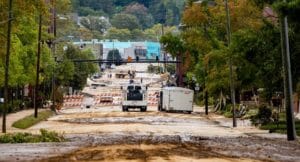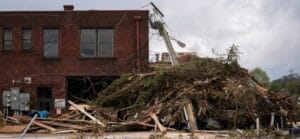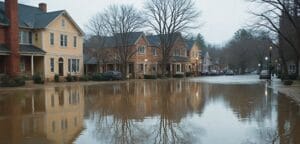Hey there! If you live in or around western North Carolina, you likely remember the chaos caused by Hurricane Helene. While hurricanes are often associated with wind, it’s the power of water that leaves the most lasting scars. Helene’s torrential rains and subsequent flooding wreaked havoc on communities, highlighting the sheer force of water in natural disasters. Let’s explore how this storm shaped the landscape and lives of those caught in its path.
Overview of Hurricane Helene
Formation and Path
Hurricane Helene formed in the Atlantic, gaining strength as it moved toward the East Coast. As it barreled through, it brought with it a deluge of rain that North Carolinians weren’t prepared for. While hurricanes can bring high winds, it’s often the water that can be the true game-changer. Helene made landfall, but it was the lingering rains that caused the most devastation.
The Timing of the Storm
What made Helene particularly troublesome was its timing. The storm hit in the fall, a season when many rivers in western North Carolina were already swollen from previous rains. This meant that when Helene unleashed its fury, the ground was already saturated, leaving little room for additional water. It was a recipe for disaster.
The Impact on Western North Carolina
Flooding and Infrastructure Damage
Once Helene passed, residents were met with scenes straight out of a nightmare. Streets transformed into rivers, and homes were inundated. Many roads were washed away or rendered impassable, making rescue and recovery efforts that much harder. Bridges were damaged, and public transportation came to a standstill. The cost of repairs quickly escalated, and towns faced monumental challenges in restoring basic infrastructure.
Effects on Homes and Businesses
The impact on homes was devastating. Many residents returned to find their possessions ruined or swept away. Small businesses that formed the backbone of local economies were left reeling. Think of a bakery that just lost its ovens or a shop that can’t sell because its inventory is submerged. The emotional toll was just as severe; losing your home or livelihood can feel like losing a part of yourself.
Community Response to Helene
Emergency Services and Evacuations
In the wake of Helene, emergency services sprang into action. Evacuations were ordered in the hardest-hit areas, with first responders risking their safety to save those trapped. It was a testament to the bravery and dedication of these heroes. Communities rallied, coming together to support one another during this crisis.
Local Government Initiatives
Local governments quickly mobilized to assess the damage and provide relief. They set up emergency shelters for displaced families and worked to coordinate aid from state and federal resources. The importance of leadership during such crises cannot be understated. Quick actions can save lives and help communities recover more efficiently.
The Role of Water in Natural Disasters
How Water Causes Destruction
While hurricanes are often known for their winds, it’s water that poses the biggest threat. Floodwaters can rise rapidly, and they have the power to sweep away everything in their path. It’s a bit like a raging river; once it gets going, there’s little that can stop it. Water can erode soil, undermine buildings, and create landslides, which only exacerbates the situation.
Comparison to Other Disasters
When we think about natural disasters, we often focus on earthquakes or wildfires. But floods can be just as devastating, if not more so. Unlike the suddenness of an earthquake, floods can linger, causing prolonged distress and damage. They seep into homes, businesses, and communities, affecting lives long after the rain has stopped.
Long-Term Consequences
Economic Impact on Communities
The aftermath of Helene wasn’t just about immediate recovery; it also had long-lasting economic implications. Businesses struggled to reopen, and local economies faced a slowdown. Job losses compounded the issues, leaving many families in precarious situations. The costs of repairs and the decline in revenue can take years to overcome.
Environmental Changes
Helene also left its mark on the environment. Flooding can lead to soil erosion, affecting agriculture and local ecosystems. Contaminants washed into rivers and lakes, which can have far-reaching effects on wildlife and water quality. Nature often takes time to heal, and communities must be proactive in restoring their environments.
Recovery and Rebuilding Efforts
Community Resilience
Despite the challenges, the resilience of communities shone through. Neighbors helped one another clean up, businesses banded together to support those in need, and a sense of solidarity emerged. It’s in moments like these that the true strength of a community is revealed.
Role of Nonprofits and Volunteers
Nonprofits and volunteers played a crucial role in the recovery process. Organizations stepped in to provide food, shelter, and support services. Volunteers helped with cleanup efforts, showing that when disaster strikes, humanity often rises to the occasion. It’s a beautiful reminder of our capacity for kindness and cooperation.
Lessons Learned
Importance of Preparedness
Hurricane Helene was a wake-up call for many. It underscored the importance of preparedness—having an emergency kit, knowing evacuation routes, and staying informed about weather updates. Taking small steps can make a huge difference when disaster strikes.
Future Implications for Disaster Management
The impact of Helene also prompts a reevaluation of disaster management strategies. Communities must invest in infrastructure that can better withstand flooding and develop response plans that take into account the unique challenges posed by water. It’s about learning from past experiences to better prepare for the future.
How AI is Transforming Business Operations in Q3: A Comprehensive Analysis
FAQs
1. What should I include in an emergency kit?
- Your emergency kit should have water, non-perishable food, medications, a flashlight, batteries, and important documents.
2. How can I prepare my home for flooding?
- Elevate electrical systems, install sump pumps, and ensure gutters and drains are clear to help mitigate flood risks.
3. What immediate steps should I take after a flood?
- Ensure your safety first, avoid floodwaters, document damage for insurance, and reach out to local authorities for assistance.
4. How can I help my community during recovery?
- Volunteer with local organizations, donate supplies, or simply check in on your neighbors to see if they need help.
5. What resources are available for disaster recovery in North Carolina?
- FEMA, local government programs, and nonprofit organizations provide various forms of assistance for recovery efforts.



